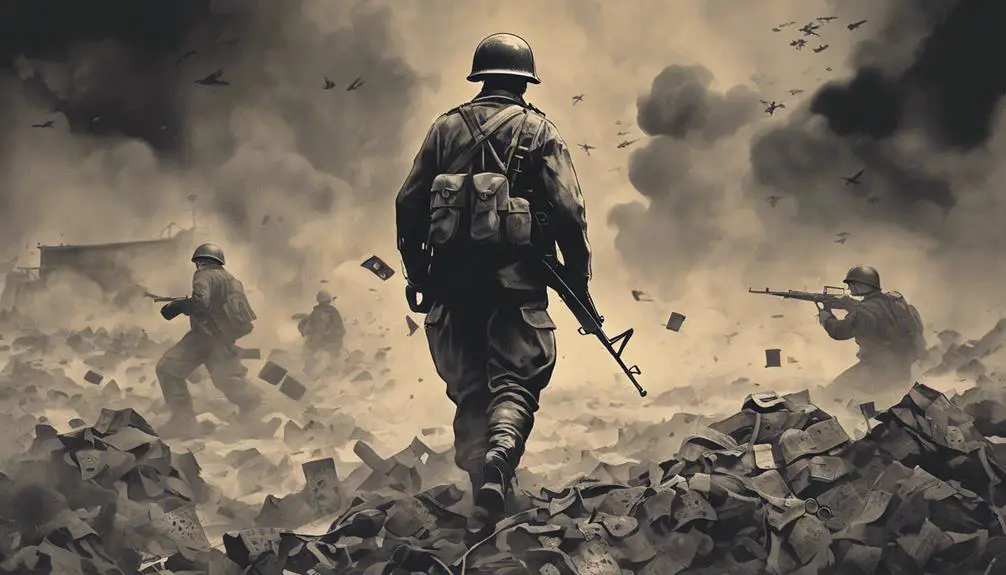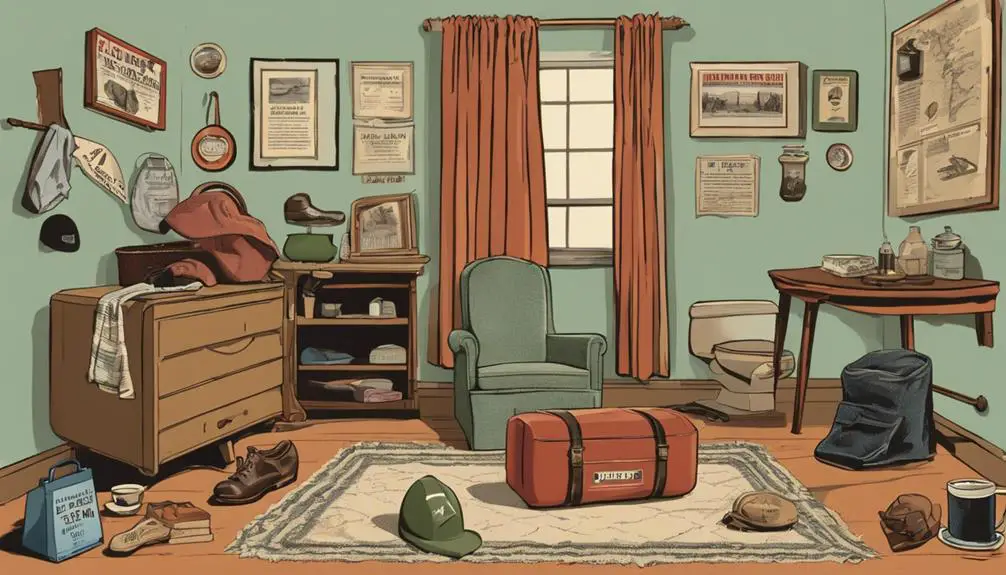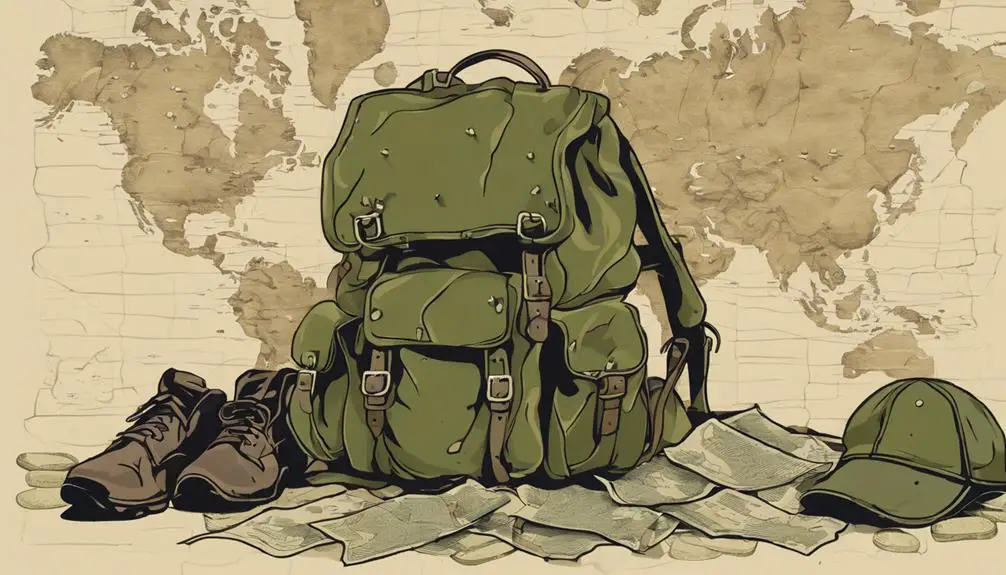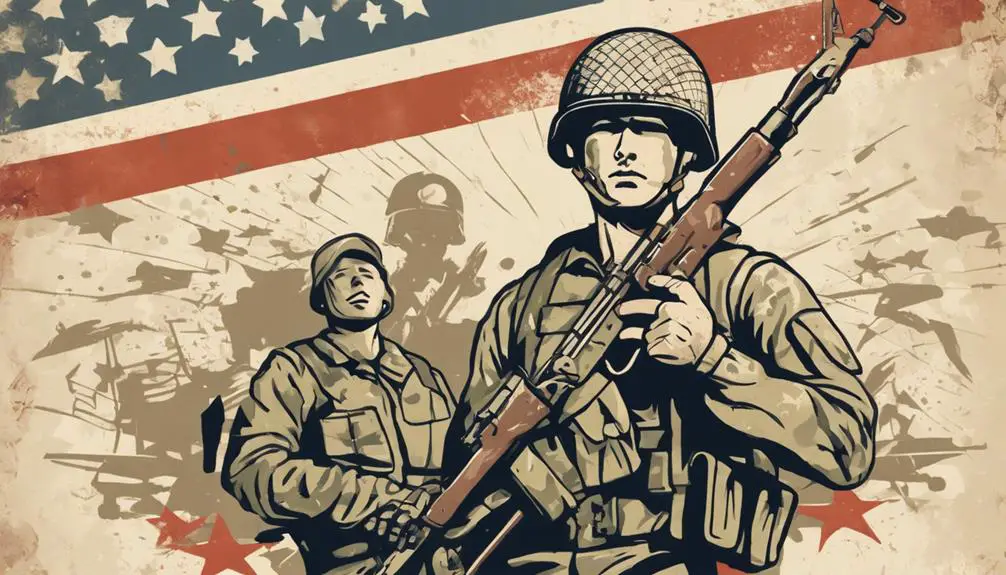As you explore American military slang during World War 2, you'll discover a unique language that facilitated efficient communication on the battlefield. Terms like 'dig in' and 'foxhole' had specific meanings, reducing confusion among troops. You'll learn how specialized language fostered camaraderie among soldiers and how humor played an essential role in coping with the harsh realities of war. From 'snafu' to 'chow time,' you'll uncover how military jargon blended with civilian language, creating a unique fusion that influenced American culture post-war. As you venture deeper, you'll uncover more about the significant role language played in shaping the lives of soldiers during WW2.
Slang of the Battlefield

As you navigated the treacherous terrain of World War 2's battlefields, you'd often hear soldiers tossing around slang that was as colorful as it was cryptic, with terms like 'foxhole' and 'dig in' becoming integral to the GI's linguistic arsenal. This Foxhole Lingo, a unique blend of Combat Cant, was more than just a casual colloquialism – it was a essential tool for survival.
In the heat of battle, clarity and brevity were important, and this slang allowed soldiers to convey complex information quickly and efficiently. 'Dig in' meant to prepare for defense, while 'foxhole' referred to the trenches themselves. This specialized language helped to reduce confusion, and its widespread use created a sense of camaraderie among the troops.
Military Jargon and Lingo
What role did military jargon and lingo play in facilitating communication among troops, and how did it impact the outcome of missions and operations during World War 2?
As you explore the world of military communication, you'll find that jargon and lingo played an essential role in ensuring smooth operations.
Code talkers, a group of Navajo soldiers, used their native language to create an unbreakable code, transmitting essential information that helped the Allies gain a strategic advantage.
Radio chatter, a term used to describe the constant flow of communication over radio waves, was filled with coded messages and abbreviations that only the intended recipients could decipher. This linguistic shorthand allowed troops to convey complex information quickly and efficiently, often making the difference between success and failure.
GI Slang in Everyday Life

During World War 2, GI slang permeated everyday life, with phrases like 'snafu' and 'chow time' becoming an integral part of the American lexicon, reflecting the war's profound impact on popular culture. As you explore the language of the time, you'll notice how military jargon seamlessly blended with civilian language, creating a unique cultural fusion. This linguistic investigation was a two-way street, with civilians adopting military slang and military personnel incorporating colloquialisms into their vocabulary.
| Slang Term | Meaning | Example Sentence |
|---|---|---|
| Snafu | Situation Normal: All Fouled Up | 'The mission was a snafu from the start.' |
| Chow Time | Mealtime | 'I'm starving, it's chow time!' |
| G.I. | Government Issue | 'I'm a G.I. serving in the Pacific.' |
| Scuttlebutt | Rumor or Gossip | 'What's the scuttlebutt on the new commander?' |
This blending of languages not only reflected the war's influence on American culture but also showcased the dynamic nature of language itself. As you investigate further into GI slang, you'll discover how it continues to shape American English today.
Coping With War Through Humor
Humor became an essential coping mechanism for GIs, who used irony, sarcasm, and ridicule to diffuse the anxiety and fear that permeated their daily lives. As you navigated the treacherous terrain of war, humor served as an indispensable tool to maintain morale and sanity. You found solace in dark humor, a twisted way of laughing at the absurdity of war, which helped you cope with the harsh realities of combat.
Some examples of humor as a coping mechanism include:
- Moral Boosters: Cartoons and comics were circulated among troops, poking fun at the military brass and the absurdities of war. These humorous sketches helped lift spirits and reminded you that even in the darkest of times, there's always room for a chuckle.
- Dark Humor: You and your fellow GIs would often joke about the grim realities of war, making light of the dangers and uncertainties that surrounded you. This dark humor was a crucial way of dealing with the trauma and uncertainty of combat.
- Sarcastic Nicknames: You and your fellow soldiers would often give sarcastic nicknames to the military equipment, like the 'Purple Heart' being referred to as the 'Purple Shaft' due to its association with injury and bloodshed. This sarcastic humor helped you cope with the harsh realities of war.
Legacy of Wartime Expressions

As you brought back wartime slang to the home front, it not only stuck in the American lexicon but also paved the way for future generations to adopt and adapt military jargon in their everyday language. This phenomenon has significant historical significance, as it highlights the profound impact of wartime experiences on American culture. The incorporation of military slang into civilian language reflects the blurring of lines between military and civilian life during wartime.
The cultural impact of wartime expressions is evident in the way they've seeped into popular culture, influencing music, film, and literature. Phrases like 'snafu' and 'fubar' have become ingrained in American slang, symbolizing the permeation of military culture into mainstream society.
This legacy of wartime expressions has also influenced the way Americans communicate, with military-derived phrases and idioms becoming an integral part of everyday conversation. By examining the legacy of wartime expressions, we gain insight into the profound and lasting impact of military culture on American society, highlighting the historical significance of military slang in shaping American language and culture.
Frequently Asked Questions
How Did American Military Slang Evolve Over Time?
As you explore the evolution of military slang, you'll discover that its origins date back to ancient times. Slang origins can be traced to informal language used by soldiers to quickly communicate and create a sense of camaraderie.
Over time, language adaptation played a significant role, with new phrases and words emerging as military personnel adapted to changing environments and technologies.
Were There Any Slang Terms Specific to African American Soldiers?
As you explore the world of military slang, you'll find that racial identity and cultural expression played a significant role in shaping the language of African American soldiers.
During World War II, they developed unique slang terms that reflected their cultural heritage and experiences.
You'll notice that these terms often blended African American Vernacular English with military jargon, creating a distinct dialect that expressed their racial identity and cultural expression.
Did Military Slang Influence Post-Ww2 American Culture?
You'll find that military slang's impact on post-WW2 American culture is undeniable. As soldiers returned home, they brought their lingo with them, influencing the civilian vernacular.
This cultural assimilation is reflected in media, where military slang is used to add realism and authenticity. Social commentary and pop culture, such as films and literature, also adopted this language, further solidifying its place in American culture.
Were There Any Censored or Banned Slang Terms During Ww2?
You might wonder, were there any censored or banned slang terms during WW2? Surprisingly, yes. Certain phrases were deemed too risqué or sensitive for public consumption. These 'Forbidden Phrases' were carefully monitored and censored by military authorities.
Even military codes, like the 'Censored Code,' were used to conceal sensitive information. You'll find that these restrictions extended to written communications, like letters and telegrams, to maintain secrecy and prevent leaks.
How Did Military Slang Vary Across Different Branches of Service?
As you explore the world of military slang, you'll discover a linguistic landscape shaped by the unique cultures of each branch.
The Navy's lingo, for instance, is infused with nautical nuances, while the Army's jargon is rooted in its boots-on-the-ground mentality.
You'll find that each branch has its distinct dialect, shaped by its specific role and environment.
Conclusion
As you reflect on the GI slang of WWII, remember that these colloquialisms were more than just casual phrases – they were a testament to sanity amidst the chaos of war.
Like a rose blooming in the trenches, humor and camaraderie blossomed in the darkest of times, a tribute to the human spirit's resilience.
These wartime expressions have left an indelible mark on American culture, a lasting legacy of the brave men and women who fought for freedom.
Their words still echo, a poignant reminder of the power of language to heal and unite.







